The Ladderback chair was one of the most popular chairs of the 17th- 18th century, which achieved such success by the simplicity of construction, clear design, and affordable price. Today, these chairs are coveted items for collectors.
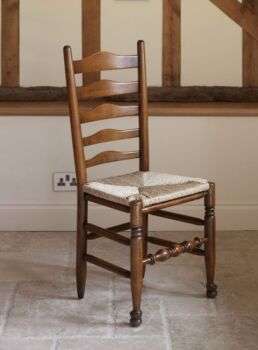
Image source: https://search.creativecommons.org/photos/c80f9c5d-bab4-4aa5-924e-8f14f32f661d by ChalonHandmade
What is a Ladderback Chair
The Ladderback chair, also known as slatback chair, got its name from the horizontal slats on the back of the chair that look like a ladder. Between straight back uprights, there are usually two to six slats that are perpendicular to each other and usually turned or rounded on a lathe. Additionally, they are connected by a groove and a tenon, and the classic version features a high back and a wicker seat.

Image source: https://search.creativecommons.org/photos/4b1d777e-c4ea-4e85-9c53-8f285129efad by ChalonHandmade
Ladderback Chair History
The Ladderback chair, were present in homes throughout Europe since the Middle Ages. By the 17th century, this type of chair gained immense popularity in England. As a rule, ladderback chairs were common sycamore or maple. By the middle of the 17th century, luxury furniture manufacturers also took notice of this chair and began to make it from walnut with exquisite decorations and engravings.
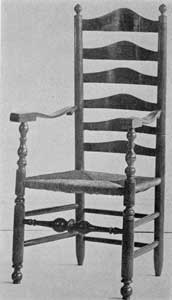
Image source: https://www.collectorsweekly.com
The Ladderback chair became a staple in homes throughout colonial America. Additionally, its popularity skyrocketed after the Protestant Reformation, as early Protestants adored the simple style. At the time, they served as a dining chair, sitting chair, and bench. In the second half of the 19th century, the popularity of simple ladderback chairs declined due to the emergence of the Victorian style.
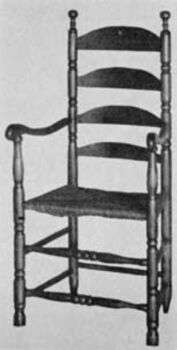
Image source: https://www.collectorsweekly.com/articles/slat-back-chairs-in-europe-and-america/
Connection to the Shakers
The Shakers are the United Society of Believers in the Second Coming of Christ, famous for their furniture, and especially for their chairs. In addition to the famous ladderback chair, they also made other models, including the Windsor style chair and the revolver swivel chair. The largest and most influential Shaker community was in New Lebanon, New York in 1787. Additionally, they remained active until 1947, according to the Metropolitan Museum of Art in New York, which holds a large collection of Shaker furniture and furnishings for houses.
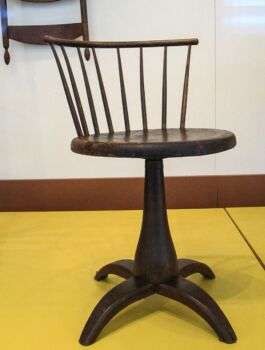
Image source: https://search.creativecommons.org/photos/7b77f1ae-9f88-433a-b259-4506982c9db4 by Ed Bierman
Foreign adornments and elements that imparted comfort were inappropriate due to the Shakers’ rigid religious beliefs. This type of furniture, according to Hidde Halbertsma’s Encyclopedia of Antiques, “has strong geometric lines with simple surfaces and functionality.” Also, the talent of the Shakers is mainly due to simplification and improvement. They removed “all tricks and ornaments,” to design furniture that met basic needs.
Production
These chairs could withstand the rough handling of that era when there were many wars and migrations. Further, they had designs that utilized the tools, materials, and knowledge that existed at the time. Whereas timber was plentiful, woodworking machinery was hard to come by. It was probably hard work at the time to produce a single ladder back chair, but the people of that time were very patient. Each rung of the ladder would, painstakingly, be made to perfection, by hand. The mortise and tenon joints would then be meticulously made and assembled.
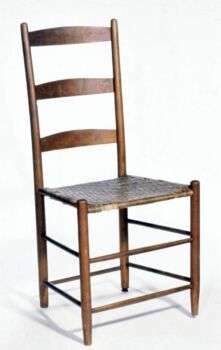
Image source: https://search.creativecommons.org/photos/f7c46973-8b76-4280-8159-cd8845ccf399
Ladderback chairs were simple in construction and not meant to stand out from the rest of the furniture. They had many practical uses ranging from sitting on, stepping on, and using as a rig to hang newly made candles. Due to the limited variety of furniture at the time, these chairs were quite handy to have around the house. Further, they occupied little space owing to the small seat area they had. Also, thanks to the ladder-like back, they were easy to carry around by simply tucking the back under the arm and clasping one of the lower rungs.

Image source: https://search.creativecommons.org/photos/3560d948-c5a3-4097-8609-d63c86a91c90 by ChalonHandmade
Ladderback chairs used such little materials that many could be made from only a little wood. Moreover, a popular version of a ladder back chair was the rocking chair. Almost any movie set, at that time, would have a ladder back rocking chair. They had a nostalgic effect on the older folk, and with good cause. Even in all their simplicity, Ladderback chairs are rather good-looking, which is why they have been around for ages and haven’t lost their appeal. Further, they are still being built in workshops across the world.
Info sources:
http://www.selfgrowth.com/articles/ladder-back-chairs-furniture-or-piece-of-history
